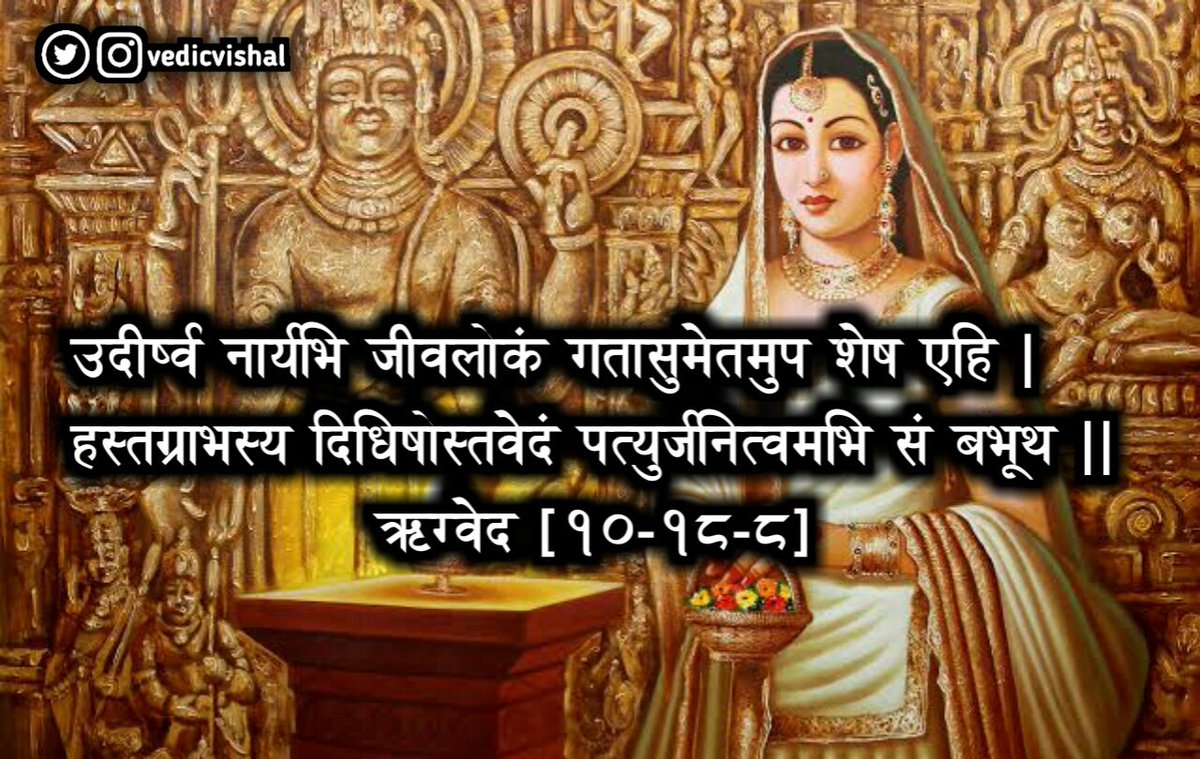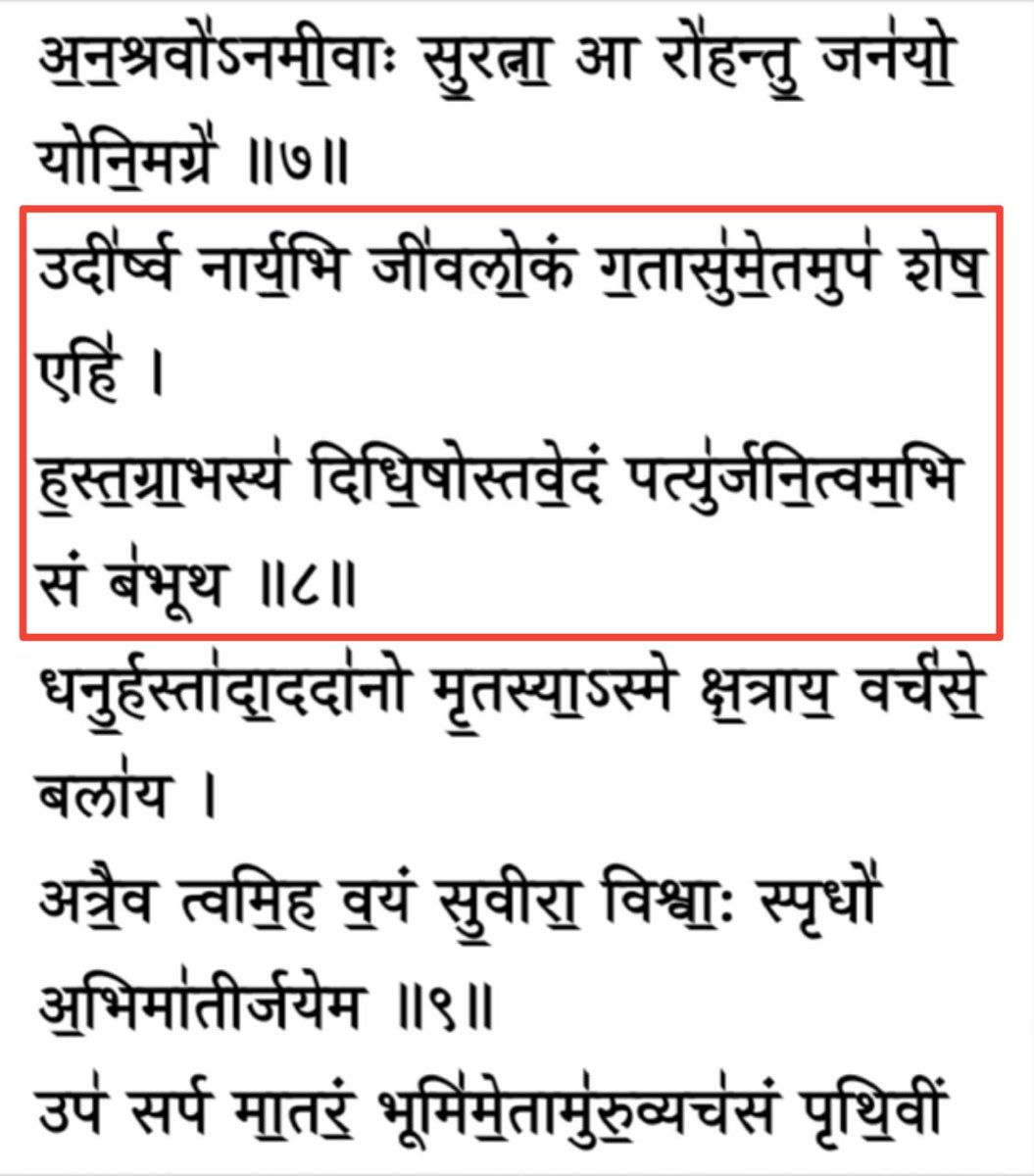Widowhood and Remarriage in Sanatan Dharma
Widows were allowed to remarry if they so desired; and faced no condemnation and ostracization socially.
Widows were allowed to remarry if they so desired; and faced no condemnation and ostracization socially.
lt is generally held by Western Scholars and their zealous followers that widows were Burned with their husband’s dead body.
Rig-Veda or any other shashtra does not mention anywhere about the practice of the burning or burial of widows with their dead husbands.
Rig-Veda or any other shashtra does not mention anywhere about the practice of the burning or burial of widows with their dead husbands.
Veda commands the widow to return to her house, to live with her children and grand children; and confers on her the right to properties of her deceased husband.
Veda clearly approves marriage of the widow. Such women faced no condemnation or isolation in the household or society. They had the right to property inherited from the dead husbands. There are riks blessing the woman and her new husband, with progeny and happiness.
Rig-Veda praises Ashwin Deva for protecting widows.
युवं ह कृशं युवमश्विना शयुं युवं विधन्तं विधवामुरुष्यथः |
युवं सनिभ्य: स्तनयन्तमश्विनाप व्रजमूर्णुथः सप्तास्यम् || — ऋग्वेद (10-40-8)
युवं ह कृशं युवमश्विना शयुं युवं विधन्तं विधवामुरुष्यथः |
युवं सनिभ्य: स्तनयन्तमश्विनाप व्रजमूर्णुथः सप्तास्यम् || — ऋग्वेद (10-40-8)
None of the richa in Rig Veda calls for the burning or burial of widow with body of her dead husband.
A set of 14 Richa in 18th Mandala of the 10th Sukta deal with treatment of widows.
A set of 14 Richa in 18th Mandala of the 10th Sukta deal with treatment of widows.
Rig-veda (10.18.8) is recited by the dead man’s brothers and others, requesting the widow to release her husband’s body for cremation.
The Richa also commands the widow to return to the world of living beings, return to her home and to her children and grand children,
The Richa also commands the widow to return to the world of living beings, return to her home and to her children and grand children,
“Rise, woman, (and go) to the world of living beings; come, this man near whom you sleep is lifeless; you have enjoyed this state of being the wife of your husband, the suitor who took you by the hand.”
This richa also, confers upon her full right on house and properties of her deceased husband.
Rig-Veda not only sanctions survival of a widow and her right to property; but also approves her marriage with the brother of her dead husband; and to live with full dignity and honor in the family.
Rig Veda therefore expressly sanctions widow-marriage. Vedas also say the widow could marry any person, not necessarily the brother of the deceased husband or a relative.
Rig-Veda (10.18.8) blesses a woman at her second marriage, with progeny and prosperity in this life time:
Translation : Go up, O woman, to the world of living; you stand by this one who is deceased; come! to him who grasps your hand, your second spouse (didhisu), you have now entered into the relation of wife to husband.
In Rig-Veda (10.18.9) the new husband while taking the widow as his wife says to her:
“let us launch a new life of valor and strength begetting male children overcoming all enemies who may assail us.”
“let us launch a new life of valor and strength begetting male children overcoming all enemies who may assail us.”
Atharv(18-3-4) blesses the widow to have a happy life with present husband:
O never punishable one! (the widow) tread the path of wise in front of thee and choose this man (another suitor) as thy husband. Joyfully receive him and may the two of you mount the world of happiness.
O never punishable one! (the widow) tread the path of wise in front of thee and choose this man (another suitor) as thy husband. Joyfully receive him and may the two of you mount the world of happiness.
Rig-Veda reveals a tolerant and moderately unbiased society characterized by sanctity of the institution of marriage, domestic purity and women and high honor for women.
The women did receive a fair and an equitable treatment and they were empowered to deal with issues that mattered in the life around them.
Read this thread to learn more about the status of:
Women in Manusmriti : https://twitter.com/vedicvishal/status/1166265417985216512?s=19
Women in Vedas : https://twitter.com/vedicvishal/status/1202146712032174080?s=19
Read this thread to learn more about the status of:
Women in Manusmriti : https://twitter.com/vedicvishal/status/1166265417985216512?s=19
Women in Vedas : https://twitter.com/vedicvishal/status/1202146712032174080?s=19

 Read on Twitter
Read on Twitter






